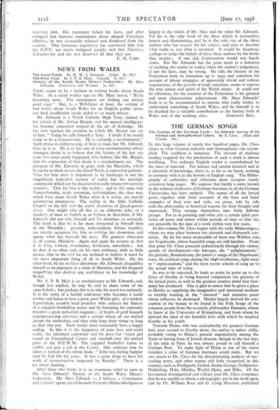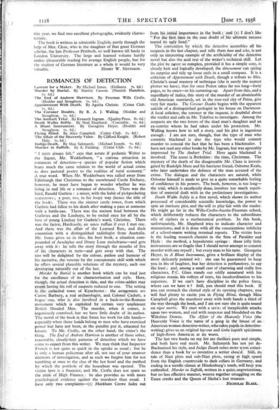THE GERMAN SONGS
IN this large volume of nearly five hundred pages, Dr. Closs shows us what German industry and thoroughness can accom- plish. The erudition is immense. The amount of studious reading required for the production of such a work is almost terrifying. Tne ordinary English reader is overwhelmed by the mass of material. For minute and careful research and as a chronicle of knowledge, there is, so far as we know, nothing to compare with it in the history of English song. The Biblio- graphy of authorities and criticisms alone occupies nearly seventeen large pages. We suppose that hardly a name known to the arduous professors of German literature in all the German Universities has been omitted. The names of all the lyrical poets, together with brief accounts of the lives and brief examples of their tone and style, are given, side by side with the philosophic or historical reasons for their thought and expression. They arrange themselves into fairly definite groups. For as in painting and other arts a certain spirit per- vades all poets and artists within periods of time so that one: can generally fix the date of a work within very few years.
In this volume Dr. Closs begins with the 'early ivlinnesingers,, whom we may place between the eleventh and thirteenth cen- turies. By far the most memorable of them was Walther von der Vogelweide, whose beautiful songs are still familiar. From that point Dr. Closs proceeds industriouslir through the various epochs of development—the baroque, the " enlightenment,"1. the pietistic, Romanticism, the patriotc songs of the Napoleonic i'• wars, the political songs during the 1848 revolutions, right away to " expressionism," and the most recent schools of song up to the actual time of today.
As was to be expected, he leads us point by point up to the!. lyrics of Goethe as being beyond comparison the greatest of the lyrical poets, as well as the greatest creative .mind that Ger- many has produced. One is glad to notice that he gives a place to Herder as supplying the imaginative and emotional medium so terribly wanting in the " classical " and imitative poets' whose influence he destroyed. Herder largely derived his con- ception of the beauty to be found in the Folk Songs of the common people from the eccentric philosopher Hamann, whom he knew at the University of Konigsberg, and from whom he derived the ideal of the heartfelt lyric with which he inspired Goethe in his youth.
Towards Heine, who was undoubtedly the greatest German lyric poet second to Goethe alone, the author is rather chilly, probably owing to Heine's present unpopularity among the Nazis as having been of Jewish descent, though to the last days of his exile in Paris he was always proud to call himself a German Poet. To make light of Heine is one of the worst mistakes a critic of German literature could make. But we owe much to Dr. Closs for his discriminating analysis of suc- ceeding poets, and other names still little recognised in this country, such as Freiligrath, Geibel, Stefan George, Grillparzer, Hoiderling, Holz, Morike, Werfel, Opitz, and Rilke. Of the last-named distinguished and solitary poet Dr. Closs complains that he was unable to obtain a photograph; yet in the Work upon him by Dr. William Rose and d G. Craig Houston, published this year, we find two excellent photographs, evidently charac- teristic.
The book is written in admirable English, partly.through the help of Mrs. Closs, who is the daughter of that great German scholar, the late Professor,Priebsch, so well known-till lately in London University. The large and learned volume hardly makes pleasurable reacting for average English people, but for the student of German literature as a whole it would be very



















































 Previous page
Previous page